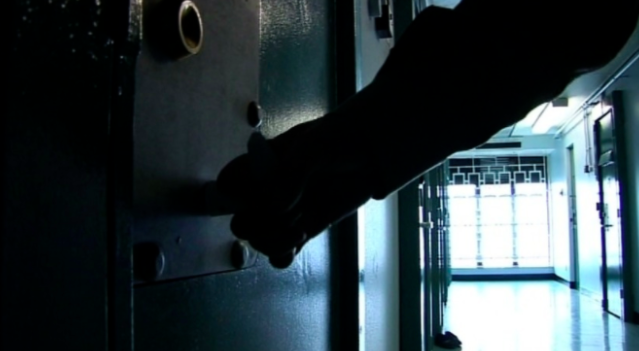THE Northern Ireland Prison Service (NIPS) carried out 58,803 full body searches on inmates in the last five years, working out at a rate of 32 such searches per day.
United Nations (UN) Mandela Rules state that full body searches should only be conducted “if absolutely necessary” and that prisons should be encouraged to use alternative methods, “keeping in mind the need to ensure security”.
However, The Detail can reveal only 48 (0.08%) of the 58,803 full body searches NIPS staff carried out in the five-year period – from April 2017 until March 2022 – resulted in officers finding weapons while just 714 (1.21%) led to drugs being found.
Gillian McNaull is a Queen's University Belfast (QUB) academic who has carried out extensive research into prisons in Northern Ireland.
She told The Detail: "Prisoners are disproportionately likely to have experienced trauma and abuse, and full body searches can be experienced as harmful and traumatising by many prisoners.
"It is disappointing then to see the continued widespread use of such searches, particularly given the outcomes highlighted."
The QUB academic also acknowledged the "lack of efficacy" of full body searches "in preventing drug supply into prisons".
She added: "The NIPS continues to rely on these oppressive supply-focused measures, when the time and resources would be better placed in reducing demand amongst the prison population."
Full body searches involve prisoners removing all of their clothes, though officers should permit inmates to replace clothing on the top half of their body prior to making them remove items from the lower half.
Understood by many to constitute strip searches, the NIPS rejects this definition but failed to outline what it believes to be the differences between full body searches and strip searches.
Amnesty International’s Northern Ireland programme director, Patrick Corrigan, said full body searches “can be degrading, even humiliating”.
He told The Detail: "We’d like to know more about the circumstances they are being used by the NIPS and whether they are being employed properly with appropriate case-by-case individual assessment of risk.”
Alternative methods
The NIPS has defended its approach to full body searches as “necessary, proportionate and reasonable” in an effort to maintain safety and order in prisons.
Full body searches are “conducted with sensitivity” – protecting the “dignity of the prisoner and staff”, the NIPS also told The Detail.
The NIPS referenced a High Court ruling, from 15 years ago, which didn’t find the service’s full body searching policy was “disproportionate or unnecessary”.
All men face full body searches on committal to prison. In addition, according to the NIPS, all individuals are also subjected to full body searches; on each occasion they return to prison after a period of leave, if they are involved in a serious incident within the prison or on the basis of specific intelligence.
The NIPS highlighted how its policy on full body searching individuals upon their entry to prison was unsuccessfully legally challenged and appealed from 2011 to 2014.
Amnesty International’s Patrick Corrigan said that the “use of alternative measures” to full body searches “should always be preferred” – for instance “electronic scanners, metal detectors or dry toilets”.
Mr Corrigan added that there have been “repeated calls by prison inspection bodies over recent years for the introduction of body scanner technology to prisons in Northern Ireland” which “could significantly reduce the dependence on full body searches”.
However, he said it’s Amnesty International's understanding that such scanners “have still not been made available”.
The NIPS responded by saying it “continues to actively consider available technology in order to further reduce the need for full body searching”, but failed to say why body scanners have not been made available in our prisons.
“No technology (is) currently available that completely removes the need for full body searching,” the NIPS also said.

Programme director of Amnesty International in Northern Ireland, Patrick Corrigan. Photo by Jonathan Porter, Press Eye.
Freedom of Information
While the NIPS found weapons and drugs in a tiny proportion of the full body searches conducted, the service said that in 5% of cases additional illicit items – other than weapons or drugs – were found.
The NIPS said this includes items such as mobile phone equipment, “an excess of items which are permitted such as bedding, magazines or cleaning materials” or “items which have been damaged or do not belong to the individual, such as televisions, hi-fis or clothing”.
Maghaberry, Northern Ireland’s main male prison, accounted for 41,871 (71%) of full body searches in the last five years. Magilligan, another male prison, had 11,138 (19%) of these searches.
Hydebank, which holds female and young adult male prisoners, accounted for the remaining 5,794 (10%) of full body searches in this time.
In addition, the Youth Justice Agency told The Detail that no under-18s were subjected to such searches in Woodlands juvenile justice facility in this period.
The Detail accessed these statistics on full body searches by submitting a Freedom of Information (FoI) request to the NIPS.
The NIPS declined to break down this information by more precise locations requested under FoI, for instance Roe House – where Maghaberry holds dissident republican prisoners – and Hydebank’s Ash House, where women are held.
According to the UN Mandela Rules, full body searches “shall not be used to harass, intimidate or unnecessarily intrude upon a prisoner’s privacy”.
However, in 2016 the former Assistant General Secretary of the Irish Congress of Trade Unions, Peter Bunting – who had helped to broker a deal in 2010 to limit the number of full body searches occurring in Northern Ireland prisons – told the Oireachtas Committee on the Implementation of the Good Friday Agreement that full body searches were used as a "tool to suppress" republicans in Roe House.
Mr Bunting, who felt the 2010 agreement was reneged on by justice authorities, also said: “There is both a sectarian attitude and there is political interference towards these people.”
Also in 2016, Lord Justice Seamus Treacy ruled that the NIPS policy at the time – of recording and retaining footage of forced strip searches – was in breach of human rights law. The case had been taken by Gerard Flannigan, a republican in custody in Roe House.
In addition, one-decade ago Criminal Justice Inspection Northern Ireland found women were subjected to too many of these searches in Hydebank’s Ash House.
Investigation
“Although statistical in nature, release of the figures requested would provide insight into part of the policies and procedures employed by (the) NIPS against the trafficking of articles," the NIPS said.
“For example, the figures would show where the searches were most frequently used and where they are less frequently used. This would be valuable information for those looking to traffic articles into prison.”
As well as refusing to outline the precise location break down of full body searches, the NIPS also declined to outline the reasons why full body searches are carried out.
The NIPS said: “Providing statistics on the reason for searches would provide insight into when (the) NIPS utilise body searches. This would be valuable information for those looking to traffic articles into prison.”
Amnesty International's Patrick Corrigan said: “Given the NIPS has declined to make public a more detailed breakdown of its use of full body searches, inspection bodies should examine search practice across the prison estate to provide assurance that each case is justified and not taking place unnecessarily or disproportionately against certain sections of the prison population.”
Dr Lesley Carroll is the Prisoner Ombudsman for Northern Ireland. Her office is responsible for handling complaints from prisoners, including in relation to full body searches.
“How full body searches are carried out is important from the perspective of dignity and treating people decently,” Dr Carroll told The Detail.
“It is important to me that those in custody are treated properly. Ensuring the safety of both those in custody and prison officers is also important which means a number of searches have to be completed.”
 By
By
